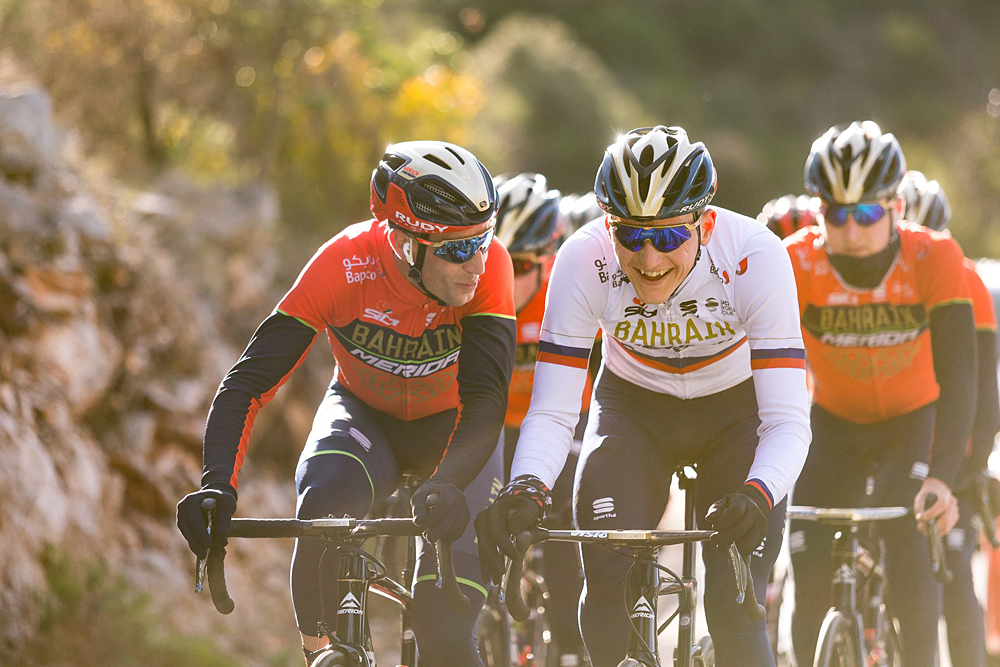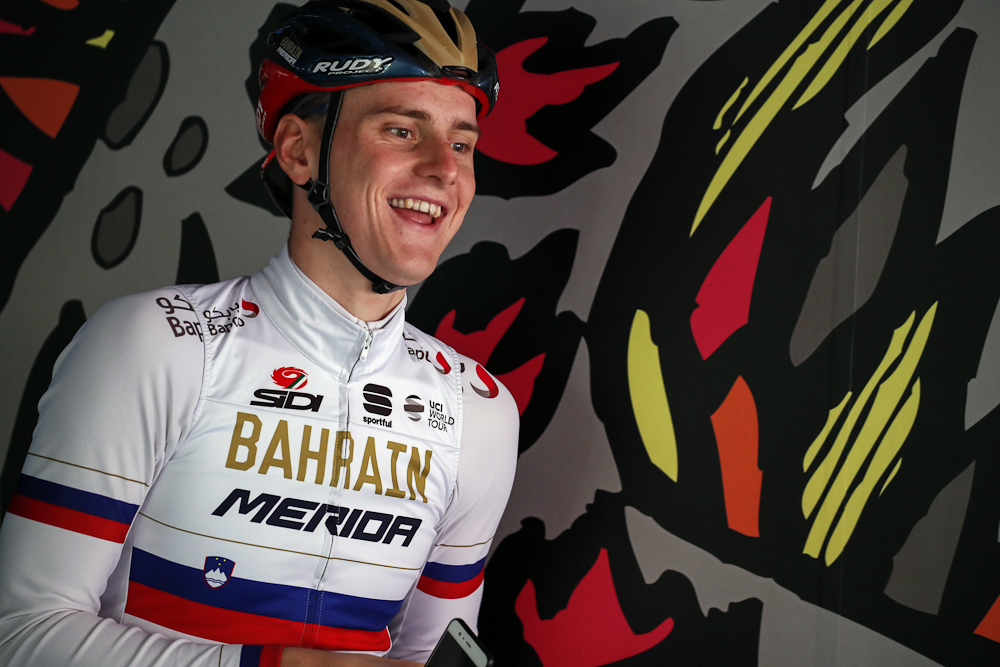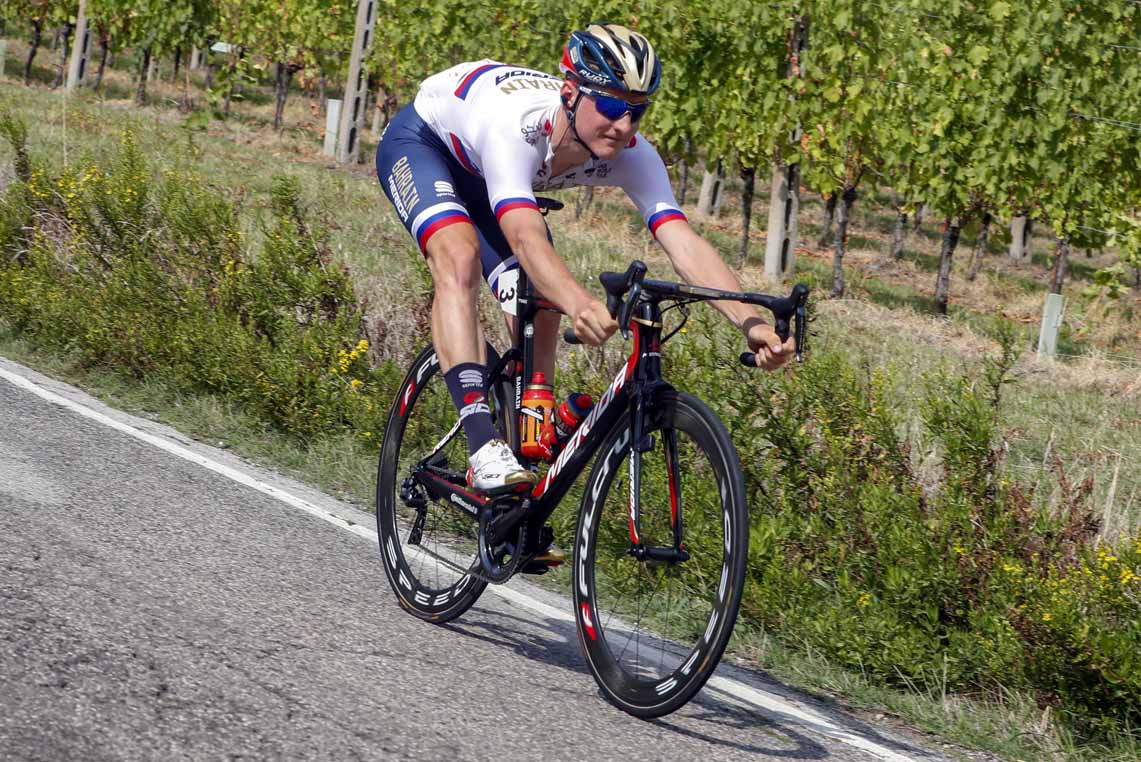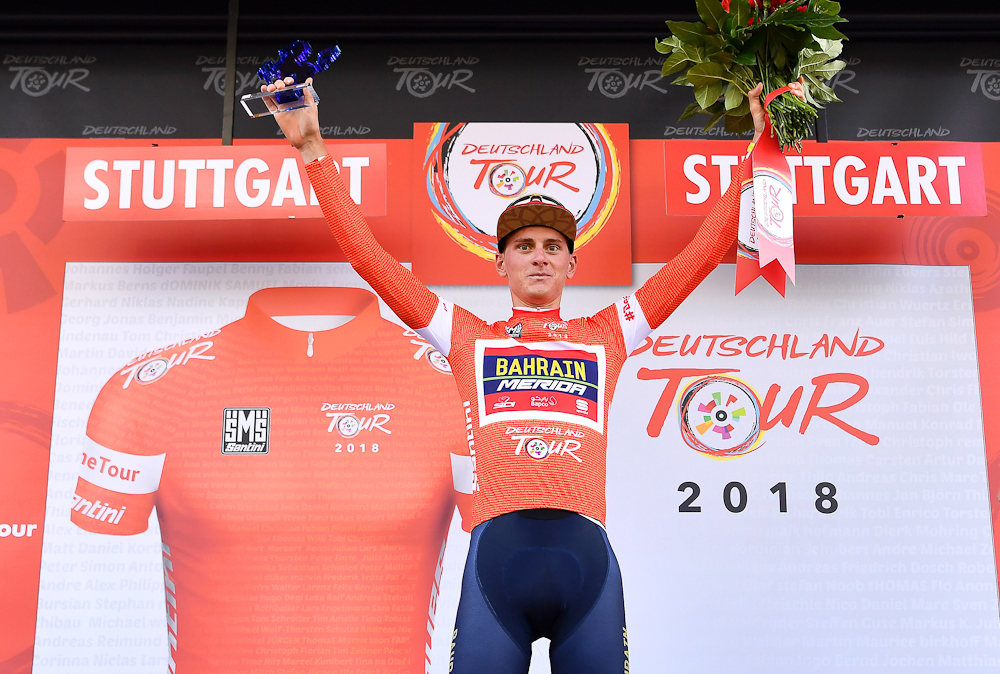Seeing cycling through different eyes: Mohoric takes aim at cobbled Classics
The steady journey of an overnight sensation




There are many ways of passing a compliment in the professional cycling, though some are more backhanded then others. When Matej Mohoric successfully defended his overall lead in Sittard on the penultimate day of the BinckBank Tour last August, there were dark mutterings from some of his Belgian colleagues about his supposed habit of taking undue risks in the peloton. One rider even suggested that there might be a loose coalition against the Slovenian on the race’s final stage.
It was hardly coincidental that the final leg was a cobbled stage over the Muur and Bosberg to Geraardsbergen. It may have been Mohoric’s first ever race on the pavé, but since seizing the overall lead in Antwerp, he had shown himself to be the strongest rider in the race. In its own inimitable way, the Flemish contingent was acknowledging Mohoric as a threat.
One was put in mind of Eric Vanderaerden’s emergence as a force in the 1980s when senior figures in the Belgian peloton – including honorary Flandrian Sean Kelly – made little secret of their attempts to bar or at least delay the youngster’s accession into the elite caste of Classics winners.
Mohoric dealt confidently with the flurry of attacks on his jersey on the breathless finishing circuit in the Flemish Ardennes, successfully defending his overall lead to claim the biggest stage race victory of his career. In his press conference in Geraardsbergen’s town hall afterwards, meanwhile, he gently deflated the polemic over his riding style. Months on, the Bahrain-Merida rider is bemused by the brief furore.
“I think those were stories based more on fiction than fact, but maybe there were some guys who weren’t happy to see a rookie win,” Mohoric tells Cyclingnews. “I don’t feel I ride any more aggressively than any of the other guys in the bunch but I am very self-confident: I take my positon and I don’t give it up even though I’m new.
“I will continue to stand up for myself. In the past, the guys with more experience and results had more respect in the bunch, but now everybody’s on the same level, and nobody’s going to give you any space even if your name is Peter Sagan or Greg Van Avermaet. That’s just the way it is.”
Such firmness should serve Mohoric well this spring, when he returns to Flanders for his first full course of the cobbled Classics after that brief appetizer last summer. A professional since 2014, Mohoric has never raced the Flemish Classics before, though on joining Bahrain-Merida at the beginning of last year, Vincenzo Nibali was among those to suggest it might yet prove his life’s calling. The 24-year-old will thus ride a full programme of cobbled races in 2019, including E3 Harelbeke, Gent-Wevelgem, the Tour of Flanders and Paris-Roubaix.
Get The Leadout Newsletter
The latest race content, interviews, features, reviews and expert buying guides, direct to your inbox!
“It’s going to be a new experience for me. I had a very brief one last year at the BinckBank Tour and I liked it,” Mohoric says. “I think my characteristics are such that I can be good in those races but we’ll see because experience counts so much in those races, and I don’t have that yet.
“I don’t think I’ll be able to do super well in Flanders this year for instance, because that’s too long and tiring, but maybe I can go well in the shorter ones that don’t suit sprinters. I do ok in long stages at stage races because I recover well, but in one-day races I prefer if it’s hard but not super long. I did well in Strade Bianche in the past but never in the Monuments. That extra hour affects things. When you’re younger it’s hard, but eventually all those kilometres you put in legs year after year should pay off.”
Development
It is easy to forget just how young Mohoric is, given that he announced himself on the global stage by winning the junior world title in Valkenburg in 2012, and then confirmed his talent by landing the under-23 rainbow jersey twelve months later in Florence. Though now entering his sixth season as a professional, the Slovenian only turned 24 in October. There seems to be ample margin for improvement, but 2018 – which saw him win the BinckBank Tour, the Deutschland Tour and a stage of the Giro d’Italia in Gualdino Tadino – felt like a watershed.
“I wouldn’t say I was physically much, much stronger than before, but I would say I was given much more responsibility, support and leadership roles from the team,” says Mohoric.
Cycling history is dotted with stories of junior and amateur world champions who never managed to live up to their considerable potential as professionals, but Mohoric insists that he never paid any heed to external expectation when he stepped up to WorldTour level with Cannondale in 2014. Be it through maturity, humility or simple common-sense, he understood that his was a learning brief during his opening seasons as a professional, which saw him ride for the merged Cannondale-Garmin in 2015 before spending two seasons at Lampre (later UAE Team Emirates).
“Mostly I heard the expectations from outside but never from my teams or from people close to me,” Mohoric says. “I just tried to do my best in training and races and I wasn’t really preoccupied with whether I would one day be able to compete with the best. I was really satisfied with how things were going because I was able to do my part for the team. I wasn’t worried about my future, because I saw I could do something to help others in any case.”
As the years progressed, Mohoric’s humility might have proved a double-edged sword. Bahrain-Merida general manager Brent Copeland, who previously worked with him at Lampre, felt that at times the youngster was almost too generous in riding for others rather than staking his own claims as a leader. As is his wont, Mohoric politely demurs, reasoning that his diligence in carrying out his domestique duties has made him the rider he is today.
“I think partly that is just the way I am. I’m not driven so much by the results,” Mohoric says. “I don’t think I lost those three or four years because I still enjoyed myself and I did my job properly.
“It’s a wheel that turns. I don’t think I was too humble or too willing to help. That all helped me and maybe helps me to perceive my teammates in a different way to a guy who turned professional and immediately got a leader’s role. I think I see cycling through different eyes to some other leaders.”
2019
While a first tilt at the cobbled Classics is the headline of any synopsis of Mohoric’s 2019 schedule, his greatest prospects of success might well lie elsewhere. He starts his campaign at the Volta a la Comunitat Valenciana next week and his first major targets come in Italy in March, with Strade Bianche, Tirreno-Adriatico and Milan-San Remo all on his programme.
“Tirreno doesn’t include mountain stages so that’s interesting for me,” Mohoric explains. “The two time trials will complicate things because somehow I haven’t performed well in them as a pro yet, but I was quite good as a junior and we’ve changed some things with the material for this year.”
A Tour de France debut is also a distinct possibility in 2019. For the time being, Mohoric’s powers of recovery and varied skillset make him a threat on transitional days in the second and third week of Grand Tours, but at some point in the future, he is open to seeing how those characteristics lend themselves to a tilt at the general classification.
“I do think one day I could be a Grand Tour rider,” Mohoric concedes, albeit with a caveat: “But that’s not going to happen in the next five or six or seven years. It will take a lot of time and a lot of kilometres. For now my strengths are elsewhere, and I should focus on one-day races and weeklong stage races.”
Mohoric remains a loosely-defined kind of a rider, without any one forte. Received wisdom suggests that being a jack of all trades is trumped by being a master of none in the ever more specialised WorldTour peloton, even if Mohoric has found success by playing between the lines. Every disadvantage has its advantage.
“I sometimes struggle because I’m quite good in many different things but I don’t excel in anything in particular,” Mohoric says. “In Belgium, I have good enough endurance to compete but then I get dropped when the other leaders open the gas on a short cobbled punchy climbs, because I’m not punchy enough to do that.
“At a race like Catalunya, I can hang on with the best climbers but I’m not good enough to beat them to the line because I’m too heavy. I do struggle with that but for now I will stay there in between because it works fine for me. I can still work something out usually.”

Barry Ryan was Head of Features at Cyclingnews. He has covered professional cycling since 2010, reporting from the Tour de France, Giro d’Italia and events from Argentina to Japan. His writing has appeared in The Independent, Procycling and Cycling Plus. He is the author of The Ascent: Sean Kelly, Stephen Roche and the Rise of Irish Cycling’s Golden Generation, published by Gill Books.